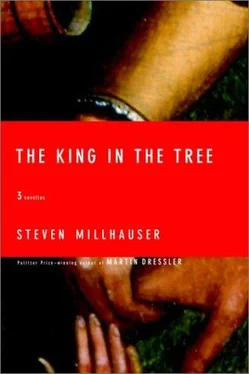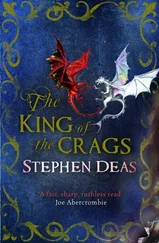The King’s fondness for this memory, which in truth I can scarcely summon, always pleases me. He was twelve years old — a Prince in his father’s castle. I was a young man of twenty, knighted and well tutored in my uncle’s manor, brought to instruct the Prince in fencing and dialectic. We often played chess in his mother’s garden, in a bower of lime trees. It was an old story, which he liked to remember over the chessboard.
“You pointed to the three pawns and said, ‘The last move of the game lies right here, if we could but see it.’ ”
“We could indeed see it, if two conditions were true: if we could always anticipate our enemy’s moves precisely, and if our own moves were always perfect.”
The King pushed back his chair and stood up. I rose immediately. The chess game was over. He walked to the chamber window, which looked out upon the orchard and the forest, glanced down without interest, and moved before a wall hanging that showed a bleeding stag surrounded by silver greyhounds.
“Do you think the Queen is happy?” he said.
“She appears well content, my lord.”
“Ah,” he said, in a tone of impatience. “But you know, Thomas, I sometimes think — a young woman brought to a foreign court, a place of strangers. How difficult it must be for her! I should like you to keep an eye out for her. Let me know if she is ever — unhappy.”
“Very well, my lord.”
“I know I can rely on you, Thomas.” He swept his arm toward the window. “Look! A fine day for hawking.”
It is night now, and I haven’t been able to dispel a sense of oppression. The meaning of our interview is all too clear: the King wishes me to spy on his wife. He has not been himself since the steward whispered in his ear.
I would think nothing of the Queen’s keeping company with Tristan, whom the King has set over her as a protector, were it not for certain looks that sometimes pass between them. Even those looks might easily be explained as entirely familial, since each has been instructed by the King to love the other well. Might they not love each other as brother and sister — she in a strange land, he without father and mother? The reverence she owes her husband requires her to cherish his nephew. Oswin says the Queen gives herself to Tristan in every bed, upon every stairway, behind every tree.
I fear that something is going to happen.
There are those at court who would not be unhappy to witness Tristan’s disgrace. Tristan has always attracted an ardent following, especially among the younger knights, but the extreme love of the King for his nephew has bred secret jealousies. Among the barons, some fear his prowess in battle, some are jealous of the King’s favor, some resent the King’s long refusal to marry for the sake of making his nephew heir to the throne. Others, to be sure, remain bound to him in passionate friendship. Yet even they may sometimes feel, at the center of their loyalty, a secret tiredness, such as one feels at the back of the neck after gazing up too long at a splendid tower.
I do not mean that Tristan is disliked. Even those who are jealous and resentful acknowledge his daring, his fearlessness, his high sense of honor, his love of comradeship. The story is told how Tristan, hunting one day with companions in the royal forest, came to a spring. As the company kneeled to drink, Tristan’s servant presented to the young lord a single bottle of wine, which he had brought along to slake his master’s thirst. Tristan, seizing the bottle and holding it high, cried, “ Thus do I drink!” and poured the bottle of wine into the spring, inviting all to partake of it.
The King’s love for Tristan runs so deep that it is like the love of a man for his own life.
Oswin the Proud, Oswin the Lascivious, is not the only source of disorder at court. Often he is seen in the despicable company of Modor. Of the three dwarves at court, Modor is the only one of consequence. Modor! — a strutting little ugly man, tyrannical, boastful, obsequious, vengeful, a puffed-up little piece of malevolence. He bullies the other dwarves cruelly, sends them on trivial errands, humiliates them before laughing barons. His harsh face puts me in mind of a clenched fist. His sole passion is intrigue. The barons laugh at him but are uneasy in his presence; he is believed to be skilled in the art of poison. He professes to revere Tristan, while letting it be known that the King favors him unduly; he ingratiates himself with the Queen, while whispering against her; his loyal service to the King does not prevent him from hinting to Tristan’s followers that the King’s marriage to Ysolt of Ireland will deprive his nephew of the promised kingship. He betrays everyone and is universally detested. Why then is his presence tolerated? It is more than tolerated: Modor is sought after eagerly. Is it that an idle court, weary of familiar pleasures, seeks the diversion of the grotesque? Or is there a deeper reason? Modor is the concentrated essence of everything base and ugly in the soul of a courtier. To see him is to experience a thrill of recognition, as when anything hidden is brought to light, followed at once by a pleasing sense of moral superiority.
When I see Oswin and Modor standing together in the angle of a shady wall, or walking side by side on a path at the edge of the forest, then I confess that I am overcome by a feeling of gratitude to the Creator for the wisdom and goodness of His divine plan, whereby the end of life is the beginning of punishment, and death is inevitable.
Something has happened — something disturbing and unexpected — something I cannot understand. I am seated at my writing table late at night, gripping my quill tightly, with trembling fingers. I must make an effort to calm myself. Calm yourself, Thomas! Writing will calm me.
It is my custom, before I retire for the night, to leave the castle by the postern and take a walk in the orchard. The rows of fruit trees — quince and pear, cherry and plum, apple and peach — stretch for acres beyond the castle wall. Here and there cleared paths, broad enough for wagons to pass at harvest-time, run all the way to the palisade of pointed stakes that encloses the orchard and makes of it another garden. Beyond the palisade flows the river, which at this point is no wider than a brook, and on the other side of the brook rises a second palisade, which marks the boundary of the royal forest. It is pleasing, on a warm summer night when the moon is nearly full, to leave the orchard paths and walk among the fruit trees themselves. Here, away from the voices of the castle, in a world of black leaves and white moonlight, a world of silence broken only by the cry of an owl, the rustle of a mouse among the grass, and the distant bark of a greyhound in the courtyard, one can possess one’s soul in peace.
Tonight I walked a little farther than usual, making my way along the wagon paths, striking suddenly into the trees, crossing a stream, entering open places not yet under cultivation, plunging again under the branches — for I was restless and wished to tire myself for sleep. Overhead, like a piece of glass stained deep blue in a cathedral window through which the sun is shining, the night sky was blue and radiant. I had come to a stretch of orchard not far from the palisade when I saw a movement in the shadows and heard a footfall. I halted, placed my hand on my sword hilt, and was about to call out when I saw two figures walking among the trees.
I knew at once it was Tristan and the Queen. They were walking so slowly that they were scarcely moving, and they seemed to lean against each other lightly. Their hands were clasped at their sides and their faces were turned toward each other, his more sharply than hers. Shadows of branches rippled across their faces and backs. The Queen’s mantle, which trailed on the ground, was decorated with small crescent moons made of silver. Over her hair she wore a simple head covering, fastened around her temples by a fillet of gold. Now and then they stepped from the rippling shadow-branches into the sudden light of the moon, before the shadows reclaimed them. As I watched their slow, dreamlike walk, under the silence of the moon, I seemed to forget that I was witnessing an act of treason punishable by death, and I felt — but it is difficult to say precisely what I felt. But I felt I was witnessing something that was of the night — an emanation of the night, as surely as the moonlight dropping softly on the leaves and branches. It was something old, older than marriage, older than kingship, something that belonged to night itself. Then I seemed to feel, rising from those scarcely breathing shadows, an exalted tenderness, a night ecstasy, an expansion of their very being, as if at any moment the night sky would crack open and reveal a dazzling light; and I turned my face away, there in my spying place, as if I had been rebuked.
Читать дальше












